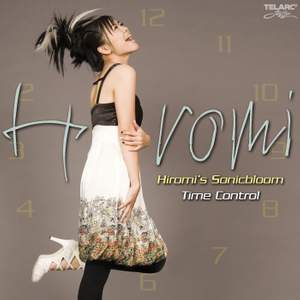Time Control spotlights nine original compositions and features guitarist Dave Fiuczynski
“Although she rips through high-speed, bebop-tinged passages with ease, Hiromi’s jazz sensibility has less to do with swing and propulsive lift than it does with atmosphere and visually oriented impressionism.”
—Los Angeles Times
Time seems pretty well tamed by clocks, calendars, and history books. But what do we really know about time?
The elusive nature of time figures prominently in Japanese keyboardist Hiromi Uehara’s March 27, 2007, release, Time Control. Collectively praised by critics and embraced by fans on both sides of the Pacific, it’s clear that Hiromi’s undeniable talents continue to grow and evolve. “I was inspired to write these pieces because my life is so hectic,” she says. “I regularly feel jet- lagged and always seem to be in a different time zone. I find myself at airports with more time to think about time, and I often wonder, ‘Am I controlling time or is time controlling me? Why do some days feel shorter than others?’”
Time Control is also the sound of a mature band at the top of its game. Recorded at Blackbird Studios in Nashville in October 2006, Hiromi’s Sonicbloom includes British bassist Tony Grey and Slovakian drummer Martin Valihora, and features a more explosive sound, thanks to special guest David “Fuze” Fiuczynski, the iconoclastic jazz-rock guitarist from Screaming Headless Torsos, KIF, Lunar Crash and Black Cherry Acid.
“Tony and Martin are amazing musicians,’ Hiromi says. “They understand the way I write music and the way I want the music to sound. I wanted to work with Fuze because I was looking for somebody who would be strong enough to influence the band. I didn’t want someone who could easily fit in – I wanted a crazy new voice, a very strong tasting spice. He’s very spontaneous, and you never know which direction he’ll take.”
Full of swagger and confidence, the nine high-powered originals on Time Control feature all of the dynamic and challenging playing that typifies Hiromi’s work. Yet as good as this gifted young pianist’s performances are, it is the quality of her compositions that marks this as an indispensable recording.
“When I write music, I think a lot about orchestration,” says Hiromi. “Since the piano and guitar are both chordal instruments, it can be hard for a pianist to play with a guitarist. So I really wanted to be careful. By adding electric guitar, the music became more rhythm-oriented and groove-based. By surrounding the piano with a lot of electric instruments, including my keyboards, the warmth of its sound stood out even more.”
Mentored by giants like Oscar Peterson, Ahmad Jamal and Chick Corea, Hiromi’s roots are in jazz but her music explores a world of new ideas by blurring the boundaries of pop, rock, classical, avant-garde and other genres.
Born in Shizuoka, Japan, in 1979, Hiromi discovered jazz when she took up the piano at age six. Within a year, she was a student of the Yamaha School of Music, whose progressive approach to musical training allowed the young student to tap into her emotions as well as mastering the technical aspects of writing and performing. At age 14, she went to Czechoslovakia and played with the Czech Philharmonic. Three years later, legendary keyboardist Chick Corea invited her to perform with him. In 1999, Hiromi came to the United States to study at the Berklee College of Music in Boston.
Hiromi first built her reputation when her 2003 Telarc debut, Another Mind — produced by Ahmad Jamal — shipped gold in Japan (100,000 units) and won the Recording Industry Association of Japan’s (RIAJ) Jazz Album of the Year Award.
Her 2004 release, Brain, won the Horizon Award at the 2004 Surround Music Awards, Swing Journal’s New Star Award, Jazz Life’s Gold Album, HMV Japan’s Best Japanese Jazz Album, and the Japan Music Pen Club’s Japanese Artist Award (the JMPC is a classical/jazz journalists club). Brain was also named Album of the Year in Swing Journal’s 2005 Readers Poll. Back in the U.S., Hiromi has been featured on the covers of Keyboard, Jazziz, Billboard and Goldmine.
In 2006, Hiromi won Best Jazz Act at the Boston Music Awards and the Guinness Jazz Festival’s Rising Star Award. She also claimed Jazzman of the Year, Pianist of the Year and Album of the Year in Swing Journal Japan’s Jazz Readers Poll for her 2006 release, Spiral.
Time Control is the sound of progressive jazz for the next generation. With her latest Telarc release, Hiromi continues her streak of simply timeless albums.





